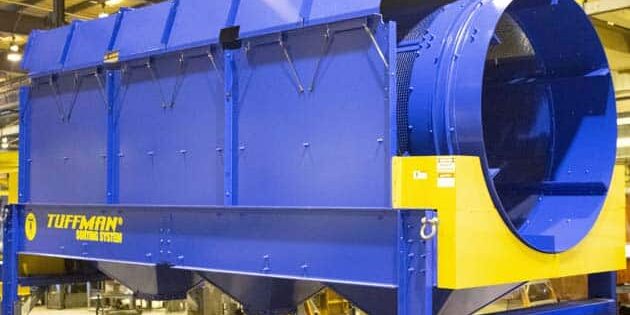What is a Trommel?
Within the manufacturing machinery industry, rotary trommel screens play a vital role across various sectors. These innovative screening devices have proven to be highly effective in separating and classifying diverse materials.
A trommel, also known as a rotary screen or drum screen, is a cylindrical screening device comprising a rotating drum with perforated or woven mesh screens. The drum is inclined at an angle, allowing materials to be introduced at one end and gradually sorted and discharged at the other. The rotation of the drum facilitates the movement and separation of materials based on their size and shape.
What is a Trommel Used For?
Trommel screens find application in various industries owing to their versatility and efficiency. Some notable applications include:
Mining/Aggregate
The mining and aggregate industries employ trommel screens to sort and classify minerals and ores based on size. By rotating the drum, the trommel efficiently separates oversized rocks and gravel from finer particles, thereby enhancing the productivity of mining operations.
Construction
Trommel screens are utilized in the construction sector to separate and classify construction aggregates like sand, gravel, and crushed stone. These screens effectively remove larger debris and contaminants, ensuring that the final product adheres to the required specifications for various construction applications.
Landscaping
In the landscaping industry, trommel screens are employed to screen and separate topsoil, mulch, and compost. They help eliminate unwanted materials such as rocks, roots, and large clumps, resulting in high-quality soil or mulch that enhances the visual appeal and functionality of landscapes.
Hemp/Cannabis
Trommel screens have become indispensable in the processing of hemp and cannabis plants, which are experiencing increased demand due to changing regulations. These screens efficiently remove undesired plant material, stems, and debris, facilitating the extraction of high-quality fibers or cannabinoids.
Compost
Composting facilities utilize trommel screens to separate organic waste and compostable materials. By classifying the compost based on size, these screens ensure that the final product is of superior quality, free from contaminants, and suitable for various agricultural and horticultural applications.
Lumber Mill By-Products
The lumber industry relies on trommel screens to effectively separate sawdust, wood chips, and other by-products. By efficiently classifying these materials, trommels enable the production of high-quality wood pellets, animal bedding, and other value-added products.
Municipal Solid Waste (MSW)
Waste management facilities use trommel screens to sort and separate municipal solid waste, thereby promoting recycling and waste-to-energy processes. These screens efficiently segregate different waste types, such as plastics, metals, and organic matter, consequently reducing the environmental impact of landfills.
How Does a Trommel Work?
The operation of a trommel screen involves several crucial components and processes. As the material is fed to the inlet end of the drum, the rotation of the drum lifts and tumbles the material, allowing smaller particles to pass through the screen openings. Larger materials are retained and transported along the length of the drum until they reach the discharge end. The angle of inclination, rotational speed, and screen design can be customized to achieve the desired screening efficiency and material separation.
The Advantages of Using a Trommel
The utilization of trommel screens in various industries offers several advantages:
- Efficient Material Separation: Trommel screens effectively separate materials based on size, ensuring the desired product quality and eliminating oversized or undersized particles.
- Versatility: Trommels can be designed with different screen sizes and configurations to accommodate various materials and applications.
- High Throughput: The rotating drum design allows continuous feeding and efficient screening, resulting in high processing capacities and improved productivity.
- Reduced Labor Requirements: The automated operation of trommel screens minimizes the need for manual sorting and reduces labor costs.
- Scalability: Trommels can be integrated into existing processing systems or used as standalone units, providing flexibility for small-scale operations and large industrial facilities.
Choosing the Appropriate Trommel Size
The appropriate size for a trommel screen depends on various factors, including the desired throughput, material characteristics, and specific application requirements. Smaller trommels are suitable for operations with lower processing volumes and finer materials, while larger trommels are better suited for heavy-duty applications and handling coarser materials. Consulting with manufacturers and industry experts can help determine the optimal size for a given application.
Get Started with Tuffman Equipment
Rotary trommel screens have become indispensable equipment in the manufacturing machinery industry, finding widespread use in mining, construction, landscaping, composting, and other sectors. Tuffman Equipment offers heavy-duty rotary trommel screens and excellent customer service to match. Get your projects moving and your materials rolling with Tuffman’s Rotarary Trommel Screens.
If you have any questions about how to get started with Tuffman or which rotary trommel sizes are right for your projects, contact us today.

